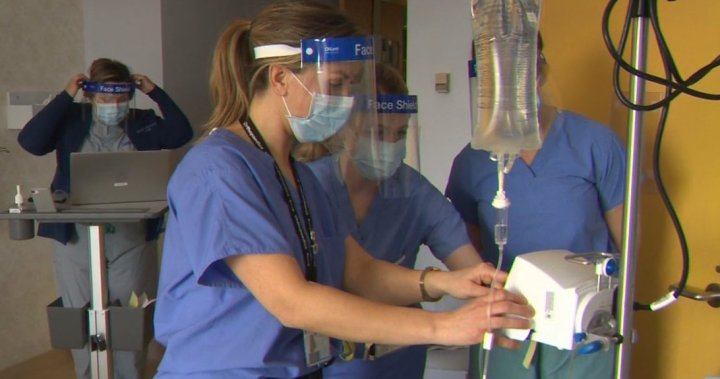Long COVID infections are leading to higher rates of health system use: study – National | Globalnews.ca
Patients who develop long COVID in Canada are accessing health care more frequently in the months after infection, which means patients are competing for scarcer resources within Canada’s ailing health system, according to a new study.
The research, published in the Canadian Medical Association Journal on Monday, found the burden of health-care use after a positive COVID-19 test is “substantial and has important health policy implications” as provincial and territorial governments across Canada continue to grapple with what many front-line workers are calling a system in “crisis.”
Read more:
‘Mind boggling’: ERs big and small across Canada struggle amid staffing crisis
The two lead authors of the study, who are also emergency room physicians, say the findings raise concerns about how well hospitals and health systems can absorb even more demand on resources that are already stretched too thin.
“I think it’s fair to say we’re very concerned. I think every emergency physician that I know is pretty concerned about the way things are going and especially heading into the winter season,” said Dr. Candace McNaughton, one of the study’s authors and an emergency physician at Sunnybrook Research Institute in Toronto.
“We all are worried about this wave of increased need that’s coming our way.”

The study measured data from more than half a million patients in Ontario, including more than 268,000 who had tested positive with COVID-19, between Jan. 1, 2020, and Dec. 31, 2021. The province-wide data was compiled by the non-profit research institute ICES.
Two months or more after infection, COVID-19 patients ended up accessing health-care services more frequently than non-positive patients, including more visits to clinics, emergency departments, more hospital stays, home care visits and time in long-term care.
Women, in particular, were among those seeking out more health services after developing long COVID.
Read more:
Diagnosing long COVID: Canadian researchers discover unique new clue
The biggest increase in health-care use was within a smaller subset of the population — about one per cent of people who tested positive for COVID-19. These patients spent an extra week or more in hospital over the following year compared with people who weren’t infected, according to the study.
While this might not sound like a large number at first glance, putting this within the context of the total number of Canadians who tested positive in early 2022 — an estimated 45 per cent of the population, according to the study — this one per cent of infected people will use nearly seven per cent of hospital days that were available in Canada before the COVID-19 pandemic, McNaughton says.
“And we have fewer staffed hospital beds now than we did then,” she added.
This data also means a family doctor who had 20 patient visits per day before the pandemic will see about 100 more visits per year.
Read more:
Nearly 30% of Canadians report ‘chronic difficulty’ accessing health care: Poll
Cumulatively, this adds up to a substantial increase, especially within a health system that is strained for reasons beyond the pandemic, McNaughton said. And it has health practitioners worried about the unsustainability of increased demand fuelled by COVID-19, she said.
“We all have a lot of concerns about how the winter is going to go and how we’re going to be able to provide care for our patients.”
For months, doctors and nurses have been raising alarm about the significant pressures they’re facing in Canada’s health system, pointing to an unprecedented shortage of health workers and a surge in demand for health services — all of which have forced temporary ER closures in hospitals across the country.

COVID-19 is partially to blame, but so too is a national shortage of nurses, physicians and family doctors that has resulted in many patients without preventative care becoming sicker and in need of more intensive health interventions.
With Canada’s health-care system already at a “breaking point,” any increase in demand for health services like the one identified in this study is substantial, says study co-author Dr. Clare Atzema, an emergency physician at Sunnybrook Research Institute and senior scientist at ICES.
“I don’t know what the definition of ‘collapsed’ is because people kind of envision this moment where a bunch of people die. This is collapse already happening,” Atzema said of Canada’s health system.
“And now we’re going to get more (patients) because of COVID coming up, and flu and long COVID.”
Read more:
Doctors say health system has ‘collapsed’ as patient surges fuel ER closures
While the study found most people infected with COVID-19 will not necessarily increase their use of the health system, they will yet have to compete for scarcer health-care resources, as will the one per cent of Canadians whose health needs increase substantially, the study found.
This increase in demand on an already over-burdened system will require significant planning and additional investments as more patients develop long COVID, McNaughton said.
“We’re hopeful that leaders and decision-makers who are in a place to make plans and allocate resources can take the information that this study provides and use that to equitably allocate resources and make plans for future needs so that we’re not surprised and we’re not trying to catch up even more,” she said.
© 2022 Global News, a division of Corus Entertainment Inc.
For all the latest health News Click Here




